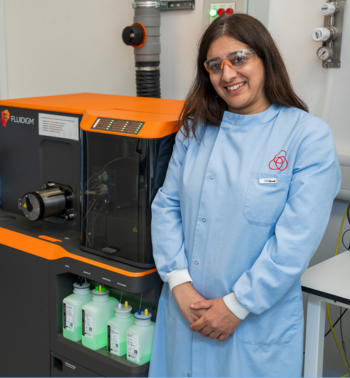19 December 2024
LifeArc and The Aplastic Anaemia Trust are funding the phase 1 TIARA trial at King's Health Partners (KHP) - investigating the safety and tolerability of expanded autologous regulatory T cells (immune cells, also referred to as Tregs) in treating patients with aplastic anaemia.
Early results have confirmed that that Tregs from AA patients are expandable, safe to infuse and may dampen the abnormal immune milieu associated with the condition.
Aplastic anaemia occurs when the bone marrow fails to produce enough red blood cells (responsible for carrying oxygen around the body), white blood cells (which help fight infection), and platelets (responsible for clotting after bleeding). People with the condition often experience fatigue, shortness of breath, headaches and chest pains. They are also prone to infections and have a tendency to bleed easily, with the potential for serious bleeding in the brain or the gut, due to a reduction in platelets. The condition can affect anyone but is most common during the late teens, and in those aged over 60 years.
Currently, there are two standard treatments for AA: immune-suppressive therapy, which uses drugs to dampen down abnormal immune responses but this will only work in two-thirds of patients; or a stem cell transplant, which is not a viable or safe treatment option for many patients. Those who fail to respond to treatment experience significant worsening of their condition, and a reduction in quality of life as well as life expectancy.
The TIARA trial has involved giving patients two infusions of their own expanded autologous Tregs – a type of cellular therapy – to treat the condition, and they are now being monitored for two years. However, one year after receiving treatment, one of the trial participants has gone from being transfusion-dependent to no longer requiring transfusions, and another patient is also showing improvements with red cell transfusion independence lasting 100 days.
This first-of-its-kind trial is funded by LifeArc and The Aplastic Anaemia Trust, and is managed by KHP Haematology – a pioneering collaboration between three NHS Foundation Trusts in London with the academic expertise of King’s College London.
Dr Catriona Crombie, Head of Rare Diseases, LifeArc, said:
“Aplastic anaemia is a condition that desperately needs new treatments. LifeArc’s work in rare disease aims to remove barriers and accelerate the pace with which innovative treatments reach the people who need them most. The early data is promising and shows that cell therapies could offer great potential in treating rare blood conditions.”
Dr Shreyans Gandhi, Consultant Haematologist at King’s College Hospital NHS Foundation Trust and Principal Investigator of the TIARA trial, said:
“Regulatory T cells (Tregs) are white blood cells that have a role in regulating or modulating the immune responses against cells of our body to prevent disease or ‘autoimmune hit’ where the cells of the immune system attack the bone marrow stem cells. We aim to collect, expand and grow the patient’s own Tregs to harness the beneficial effects at controlling the auto-immune attack. “In this trial we aim to discover whether a patient’s own Tregs can be modified to treat Aplastic Anaemia – a condition that can have a huge impact on a person’s life – and determine whether healthy bone marrow stem cells recover, thereby improving patients’ blood count. “This type of treatment has shown promising signs in other conditions and we hope to build upon existing research to benefit those with Aplastic Anaemia.”
Professor Ghulam Mufti, Chief Investigator of the TIARA trial from King’s College London, added:
“There is an urgent need for new treatments to offer patients a better chance of survival and improve their quality of life.
“The TIARA trial – the first to use high doses of Tregs in two doses, two weeks apart – is based on six years of pioneering work at King’s College London in which it was discovered that Tregs were abnormal and reduced in numbers in patients with Aplastic Anaemia.”





